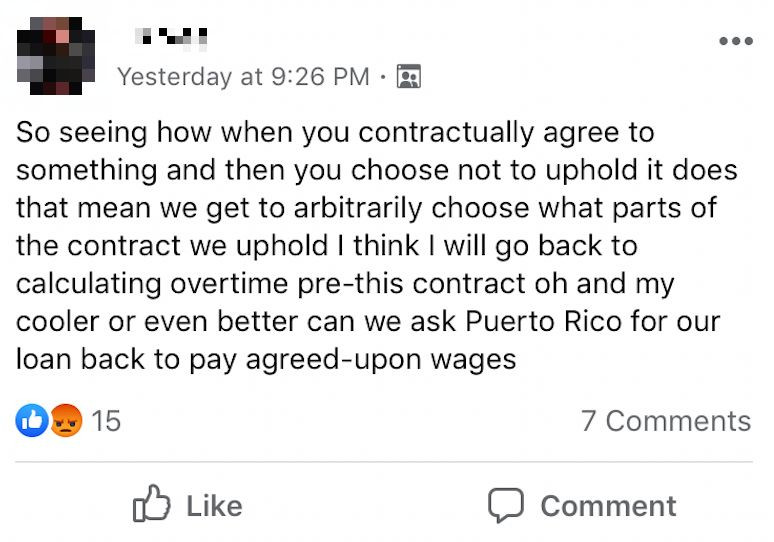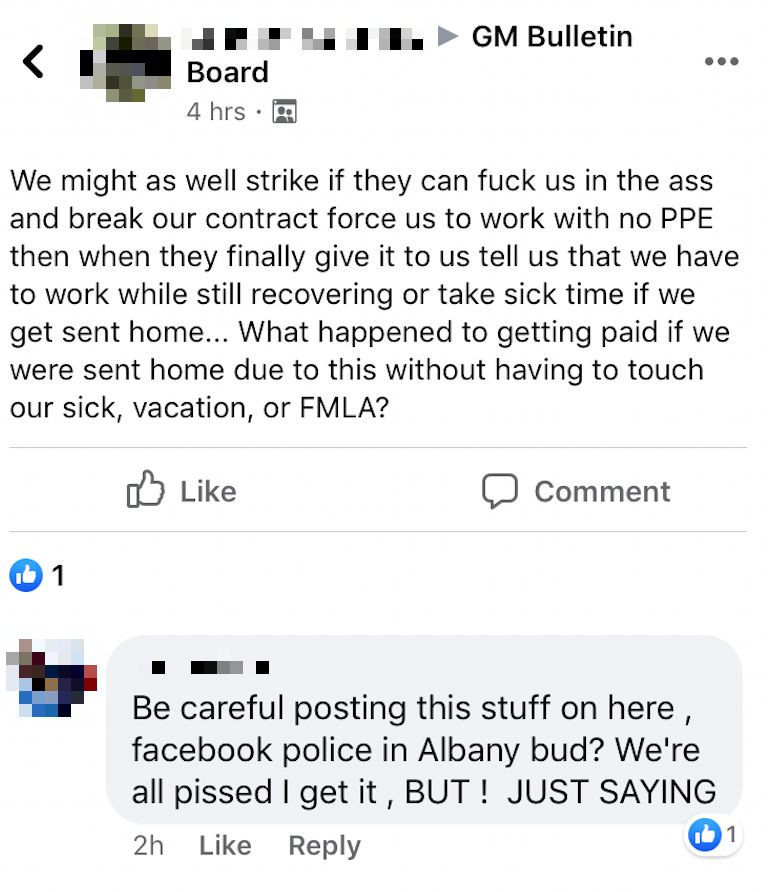
NY Continued to Relocate Inmates After Saying It Would Stop Due to COVID-19
April 9, 2020The New York carceral system is currently struggling to contain coronavirus outbreaks in its prisons, and both correctional officers and inmates allege that the response by prison leadership only hastened the disease’s spread. And following weeks of inaction and half-measures, members of the state correctional officers’ union are now debating whether to take direct labor action.
State correctional officers (COs) and inmates alike have told VICE that after an initial announcement that New York State would shut down inter-prison transport March 23rd, the transport continued at a high rate for several days. This included moving prisoners from Rikers, a coronavirus hot zone, to other prisons upstate, potentially spreading the virus not just to inmates, but to COs and other support staff and the civilians they may interact with where they live.
The transport continued long after non-essential services were closed statewide and after visitations were shut down. The transport also continued even after Harvey Weinstein, who tested positive for coronavirus on March 23, was moved from Rikers Island to the Wende Correctional Facility on March 18, where COs suspect he became a major source of infection for inmates who shared his transport van as well as other inmates at Wende.
“The state has said that they stopped [inter-facility transport] as of Monday [March 23], and then Tuesday, there were buses all over the road,” one CO told VICE. “They’re saying that it was due to whatever reason, whether it was medical issues, or special housing, or whatever it may be. But that's not the case. It's just the state's way of getting away with doing what they still want to do.”
The officers felt the state ignored their concerns about how the common activity of transporting inmates between city jails and state facilities could hasten the spread of COVID-19, or the lack of personal protective equipment available to them while on shift. The Governor’s office has declined multiple requests for comment on this article.
It’s clear that American correctional facilities are uniquely vulnerable to COVID-19, thanks mostly to close quarters, shabby living conditions, and bureaucratic apathy. We’re watching that vulnerability play out in real time, across the country—as in one man’s Facebook Live plea from the inside of an Ohio facility, reports of an underreported, uncontained COVID-19 outbreak in a Louisiana prison, and so many other cases, the dispatches from within the penal system are abjectly horrifying.
According to social media posts obtained by VICE and corroborated by a current NYS CO, officers are considering collective actions such as work slowdowns and coordinated call-outs. Inmates said they felt restless and under-informed about COVID-19, with extremely limited access to cleaning supplies and no access to N95 masks, gloves, or other gear that could temper their risk of catching the coronavirus. It remains unclear how the state’s incarcerated population could react to this sense of abandonment (though reports of unrest elsewhere could be a harbinger).
Complaints about the way the state government has handled its prison system in the midst of a pandemic have circulated through private NYSDOCCS Facebook groups since mid-March, when the threat of COVID-19 first began to solidify in the eyes of local and federal leaders. In these groups, and on their personal Facebook pages, COs describe feeling abandoned by the state and by their union, with limited resources in the face of a pandemic and an increasingly fearful inmate population.
According to screenshots obtained by VICE from sources, most of these concerns initially centered around two subjects: that COs were forbidden by the state government to use personal protective equipment like N95 masks while on shift, due to the classification of the masks as a potential weapon, and the continued grind of interfacility transit after the alleged March 23 suspension date.
The NYS Correctional Officers & Police Benevolent Association (NYSCOPBA) backed its membership’s widespread request for PPE access, and declared victory when NYSDOCCS conceded partway in early April, initially allowing COs to bring their own gear and then issuing a memo Thursday stating that the department will issue surgical masks to employees. (In New York City, a judge ruled last week that COs must be provided with PPE before every shift. Per the New York Post, the city has since filed an appeal.)
The department still forbids incarcerated people from covering their faces. One CO told VICE that inmates have resorted to pulling their T-shirts over their faces in lieu of any other protective option.
The call to end interfacility transport, known as “draft” within the carceral system, came from NYSCOPBA after the state had already heeded their request to pause visitations for inmates until Easter. According to a NYSCOPBA spokesperson, they’re satisfied with the way the state responded to their request to pause non-essential transport, despite rumblings from COs that draft was proceeding as usual. “I'm not going to comment on something that's an anonymous tip… It just doesn't serve as any purpose [sic],” the spokesperson told VICE. The spokesperson said that, per NYSCOPBA’s understanding, interfacility transport halted Monday, March 23.
According to an NYSDOCCS spokesperson, the state correctional department actually waited until Thursday, March 26 before it “suspended intake of incarcerated individuals from county facilities and stopped internal transfers of incarcerated individuals,” except for under “medical” or “other exigent circumstances.”
The people inside the state’s correctional facilities said the so-called suspended draft was more of a PR move than reality. VICE spoke with three COs, one retiree who remains close with his former coworkers, and one inmate, who all shared concerns about the way interfacility transport, or draft, could facilitate the spread of COVID-19 through New York state.
Do you have any additional information about the NYS Clean initiative? We’d love to hear from you. Using a non-work phone or computer, you can contact Katie Way securely on Signal on +1 571 205 0611, or email katie.way@vice.com.
“The state has said that they stopped doing [draft] as of Monday [March 23], and then Tuesday, there were buses all over the road,” one CO told VICE. “They’re saying that it was due to whatever reason, whether it was medical issues, or special housing, or whatever it may be. But that's not the case. It's just the state's way of getting away with doing what they still want to do.”
Initially, according to a memo obtained by VICE, the number of inmates transported from facility to facility was decreased to half of a vehicle’s carrying capacity—a measure COs found insufficient. “On their memorandum, [the state said], ‘We won't hook them up all together, we won't take like 40 [inmates] on a bus, we’ll take 20,’" a retired CO—who worked as a draft officer for over a dozen years—told VICE. "But the point being is, you're still taking them from Point A to Point B.” “You're not keeping everybody where they are so that it doesn’t spread so much.”
One source shared with VICE a post from a private Facebook group for NYS correctional officers, in which a member of the group CO shared a screenshot of Facebook messages from March 24 with the official Facebook account of local representative Assemblyman D. Billy Jones. The officer asked “why Inmates are still being Transfered Prison to Prison [sic] there should be no movement.” The account responded: “Yes, I have been requesting this of DOCCS officials and transfers ended Yesterday. Thanks for reaching out.” A commenter responded to the screenshots to say he thought what COs were witnessing belied the response: “Looks like DOCCS lied to everyone, and they all believed it.”
While many of the concerns stem from personal experience, Harvey Weinstein’s transport from Rikers Island to Wende Correctional Facility has become a focus of ire. Per screenshots obtained by VICE, and according to interviews, COs have carefully monitored the outbreak at Wende Correctional following Weinstein’s arrival, and believe the producer and convicted rapist was a source at Wende.
Rikers Island is in the midst of a severe COVID-19 outbreak—the majority of the city’s 700 positive cases within the system are clustered on Rikers. While there is still a lot to learn about how the virus spreads, discussion amongst COs on Facebook and elsewhere has connected these dots: the transport of Harvey Weinstein, who NYSDOCCS officials have stated they believe was infected at the city jail, and a busload of other inmates from Rikers Island in late February corresponds directly with the subsequent outbreak at Wende Correctional Facility, where dozens of COs and an undisclosed number of inmates are currently quarantined as of late March.
“Buses leave from New York City in the morning, get to reception centers around 5am, [and] unload their prisoners,” a CO told VICE. “From that reception center, they’ll be there a week or two, or even less. And then get shipped even further around the state. Those buses have not stopped at all, even though New York City is a hot zone.”
Chris, an inmate from Great Meadow Correctional Facility whose name has been changed here to protect his anonymity, corroborated the narrative that the draft, along with lack of protective gear or cleaning supplies, endangered him and his fellow inmates. When he spoke with VICE last week, he said inmates have continued to enter and leave Great Meadow at a steady pace. He said he didn’t notice a pause in intake the week of March 23 and expressed concern that he was housed on the same block as the new intakes: E Block, where, alongside Chris, all of the other workers bottling hand sanitizer for Governor Andrew Cuomo's "NYS Clean" initiative live.
“[The new intakes are] not isolated from nobody. They come in on chains and they come into the facility,” Chris said. “They can cough, and it goes right out the bars! It’s not like you’re in an isolated area—you’re on a block that’s open. And I can only picture with a Kodak camera the COs taking the time to wipe down each and each pair of handcuffs after they use them.”
Chris pointed out the contradiction between the NYSDOCCS decision to pause visitation for inmates while continuing draft. He said Great Meadow also allows civilian contractors in and out of the facility, and has had to call COs in from other facilities in order to manage the NYS Clean initiative and the associated fire hazard so much sanitizer in one place poses.
The COs who spoke to VICE mirrored Chris’s concerns about moving in and out of their facilities on a regular basis, citing fears for the health and safety of a pregnant spouse and an immunocompromised child. In the wake of an announcement from NYSCOPBA stating the annual 2 percent raise offered to COs is to be delayed indefinitely, COs are now considering taking concrete action.
In an open letter written by COs sent to NYSCOPBA and shared with VICE, COs listed their grievances, including pressure to return to work soon after a COVID-19 diagnosis, unpaid overtime, the fight to wear PPE, and canceled vacation days. The statement ended with an anti-Cuomo slam and a call to action:
Cuomo is taking away corrections officers contractual raises in a time where many of us have become the sole providers for our families. "To top it off they are directly saying that there is no guarantee they will ever honor the contract that they forced upon us. If the rule of law binding [an] employer to [an] employee has no worth then this state has no worth or right to enforce any law. For those who don't know the law which prevents the state employees from striking is called the Taylor law. I can’t believe the way this state and it’s legislators treat it's sworn peace officers [sic].
Other private social media posts from COs shared with VICE echoed this sentiment.



The COs VICE spoke with shared this mistrust of state leadership. “This is how it’s spreading from the city to every suburb in New York state, it’s through the prison transportation system,” one said on March 24. Willingness aside, he also expressed skepticism about the state’s ability to stop draft before it’s too late. “It took them a month to stop visits, and that’s only until Easter right now,” he said.
Activists have repeatedly called on Gov. Cuomo and New York state to release at-risk inmates before infection rate reaches a critical mass, to muted response.
New York state COs have, in the past, come under fire for violence perpetrated against the state’s incarcerated population, most notably in the wake of the 2015 Clinton Correctional Facility escape. But according to one CO who spoke to VICE, the danger COVID-19 poses has only fed rage directed outwards and upwards at the system they feel is failing them.
“For the first time, corrections officers hate the governor and the union and branches more than they hate the inmate population,” the officer wrote via Signal. “Your 60-year-old man who robbed someone while drunk—fuck it, let him go.”


